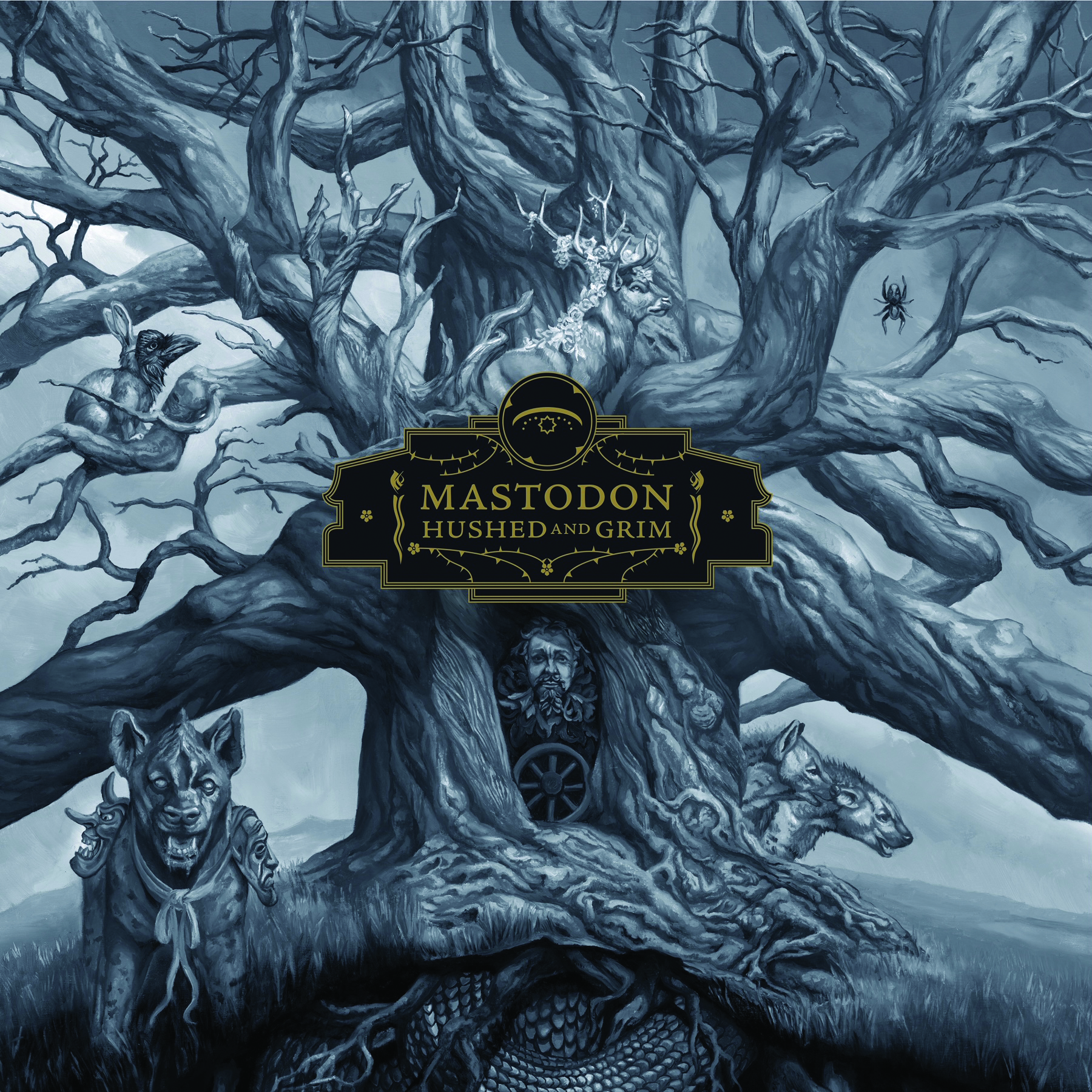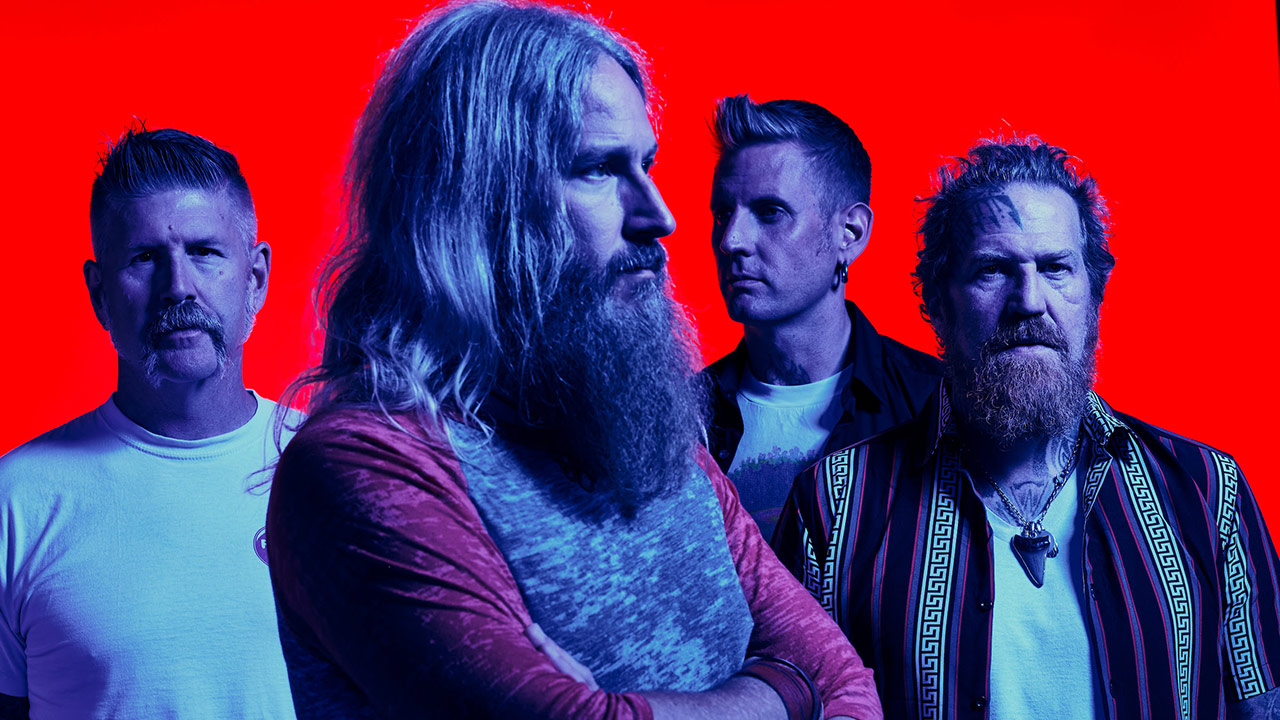You’d be forgiven for thinking that Mastodon have had the perfect rock’n’roll journey. By the time the Atlanta quartet released their debut album, 2002’s Remission, the underground music scene was already aflame with anticipation. Their prog-inspired twist on the sludge of High On Fire and Neurosis enthralled live audiences from the word go; it had even earned them a deal with Relapse Records, one-time home to avant-garde superstars Baroness, Amorphis and The Dillinger Escape Plan.
When follow-up Leviathan splashed in 2004, the band were instantly made men. Its progressive metal rampage was as brutal as it was forward-thinking. For every pulse-pounding, bullheaded riff (see: Blood And Thunder and Iron Tusk), there was an incalculable risk: the 13-minute behemoth Hearts Alive, twanging guitars honouring Mastodon’s Deep South roots; an album-long theme of retelling Moby Dick.
Underground acclaim morphed into mainstream adulation after fifth album The Hunter embraced arena rock in 2011. Cue a decade of beloved albums and academy-level headline tours, with a 2018 Grammy Award for Best Metal Performance thrown in along the way. By any heavy band’s standards, it’s been a storybook ascendancy.
Now comes Hushed And Grim: a partial return to Mastodon’s roots of progressive music-making, albeit enthused with the anthemic flair accrued over the last decade. “As an overall album, I think Hushed And Grim is our proggiest,” says the band’s rhythm guitarist, Bill Kelliher – and it’s easy to see why. Their eighth full-length is their first double album, home to 15 songs over the course of a gargantuan 88 minutes.
Clamouring percussion fades in to commence the opening track, Pain With An Anchor: a hard rocker that juxtaposes the croon of singer-drummer Brann Dailor against bassist and frontman Troy Sanders’ gravel pipes. Lead guitarist Brent Hinds’ shrill whine completes the vocal trifecta on The Beast, driving home a jangling Southern rock ballad. Funk basslines lead the swagger of Sickle And Peace, which is flipped by Pushing The Tides’ squealing post-hardcore. It’s an eclectic smörgåsbord that concludes with three wholeheartedly prog metal giants – Gobblers Of Dregs, Eyes Of Serpents and Gigantium – each as grand and meditative as the next.

“On the other records, there’s a proggy song here or there,” continues Kelliher, “but, overall, every song on Hushed And Grim has been progged out a little bit.”
“We flirt with prog and include it in the repertoire,” adds Dailor. “We fold it in, but we’re not just one thing. I don’t think we’re just a prog band, which in itself lends to us being progressive. Take a band like Genesis, for instance, one of my favourites. Their early stuff, there was a bit of everything. Prog rock is a big influence on the members of our band; the influence of Rush, Genesis and King Crimson is probably more apparent in our version of heavy rock than a lot of other bands.”
The scope and eclecticism of Hushed And Grim will make it yet another triumph in the Mastodon annals. However, behind almost all of their most beloved works, there lies tragedy. Their 2009 album, Crack The Skye, is often cited as their magnum opus: the apotheosis of Mastodon’s progressive heyday, emphasising mind-bending movements and psychedelia. However, its alien narrative, a story of astral projection and time travel, was shaped by Hinds’ three-day coma in 2007.
Hinds’ candid songwriting inspired the same from Dailor, who penned the title track and named it after his sister, Skye. A year Brann’s junior, she suffered from chronic fatigue syndrome that was misunderstood by doctors and loved ones, before taking her own life at the age of 14. ‘Please tell Lucifer he can’t have this one,’ the drummer cries over a sullen refrain. ‘Her spirit’s too strong.’ Similarly, The Hunter honours Hinds’ brother, Brad, who died during a hunting trip while Mastodon were recording in 2010.
It was Sanders and Kelliher’s turn to bare their souls on 2017’s Emperor Of Sand. The arena metal of the hit Show Yourself belied a sombre lyrical theme; the album’s plot of a desert wanderer being plagued by an unshakable curse was shaped by real-life cancer battles. In July 2015, Sanders’ wife, Jeza, was diagnosed with breast cancer. The band cancelled summer touring as a result, although she thankfully recovered. Then, in September 2016, Kelliher’s mother died from a brain tumour.
“I’m not sick of writing music about tragedies,” the guitarist says, “but I’m getting sick of them happening. As you get older, you lose so many people so quickly. I lost my dad 21 years ago; I don’t have much family left to talk about that stuff with, aside from my wife. With the guys in the band, our way of coping is putting those feelings that we can’t really talk to anyone about into our fingers, into our music.”
“We don’t really talk about it,” admits Dailor. “We don’t sit down and have a therapy session; we play and that makes everybody feel a little bit better. When we’re in tremendous amounts of spiritual pain, the way we exorcise it is through music.”
Hushed And Grim continues this trend of manifesting heartache. According
to Dailor, “at least one verse” in every single song is dedicated to Mastodon’s longtime manager, Nick John, who died from pancreatic cancer in September 2018. Dagger becomes a downtrodden dirge as Sanders hums, ‘I cannot bear to believe that you have left this Earth,’ while Skeleton Of Splendor’s call-and-answer chorus describes the hardships of moving on: ‘To my detriment, I forge ahead, unscarred.’

John managed Mastodon for 15 years, joining the fray in 2003. He was recommended to the band by their labelmates in grindcore rabble Brutal Truth. Remembers Dailor: “He came around right before Leviathan came out. We were a ‘buzz band’ back then. Our name was out there, especially in management camps: ‘Something’s gonna happen with this band, so somebody jump on them!’ But, we
were very guarded. We didn’t wanna bring anyone else into our camp and
a manager, or anything that smelled like ‘selling out’, we didn’t wanna go near it.”
However, the passionate John proved himself to be a hemisphere away from the “LA-type personality” Mastodon feared a manager would bring. “We were his Led Zeppelin,” the drummer states: a titanic compliment, considering the hard rock pioneers were John’s all-time favourite band.
“Not only was he the greatest manager in the world, he was one of my closest friends,” adds Kelliher. “He was always there, any time I needed to talk to him about anything. He could talk you down off a ledge. He always knew how to turn the situation around; if you feel like a piece of shit, he’d make you feel like the best piece of shit ever. I’ve seen some managers march around backstage – ‘I need this! I need that!’ – but he was not like that. He’d kill with kindness. You catch more wasps with honey than salt.”
Just days before John’s death, Mastodon cancelled a US tour with alt-rockers Dinosaur Jr, citing “a critical situation of a member of the Mastodon family”. The band flew to their manager’s house to be at his side during his hospice care; the title of Hushed And Grim is their description of the mood there, as they stayed by his hospital bed in his living room.
“There was this admittance that Nick’s gonna pass away in a couple days,” remembers Dailor. “Everyone’s really quiet, but there’s a tragedy unfolding. It’s not that a tragedy’s happening and people are running around screaming; it’s more this acceptance that this is gonna happen and no one can do anything about it.”
After his passing, John’s wife, Colleen, asked Mastodon to play a cover of Stairway To Heaven at his funeral. Admits Dailor, “I was like, ‘No! I don’t wanna play Stairway To Heaven live at a funeral for Nick, our best friend. I’m gonna be a mess.’ But, then, of course you have to.”
Unbeknown to the band, their rendition of the classic was recorded by Joe Duplantier, the frontman of progressive metal giants Gojira, who John also managed. He scrubbed up the audio and presented it to the band, giving them the confidence to re-record the song in the studio. Almost instantaneously, they got the idea of releasing the two versions as an LP on Record Store Day, which Dailor calls “Nick’s favourite holiday.”

Coming to terms with losing who they once described as “the band’s dad”, Mastodon again found therapy through songwriting. However, it took a full year for them to start formally sharing ideas. In the meantime, while still grieving, they had to tour with fellow prog metal act Coheed And Cambria in the spring and summer of 2019. They reconvened in September, initially planning to create a “fast, heavy, pissed-off record”.
“We were angry about what had happened to our friend,” explains Dailor. “Over time, it became a slower, more doomy kind of [album]. There are some rippers, but overall it’s a more expansive, melancholy record.”
Demoing began at the dawn of 2020. Then, Covid hit. Everything closed. The band went home. They couldn’t see each other for almost half a year. But, the creative juices kept flowing. After re-reconvening in August, they recorded two hours of demos.
“The pandemic gave us time to grow and keep on expanding and writing,” explains Kelliher. “We had about 20 songs; the 15 we chose for the album were the most together.”
“To whittle it down to 55 minutes – our usual sweet spot – we would have had to get rid of six or seven songs and it wasn’t happening,” adds Dailor. “I said, ‘I’m loving this whole thing from start to finish.’”
Unsurprisingly for a musician in a promotional interview, Kelliher says that Hushed And Grim is his favourite Mastodon album. Yet, the tragedy that informed it has made it a bittersweet victory. “It’s just like when I listen to Roots Remain on Emperor Of Sand,” he says. “There are parts in that song that remind me of watching my mum fade away. This time, Nick died and Hushed And Grim is me getting those demons out of my head. I’m never gonna get over it. What can we do to make people realise what a great soul we lost? We can turn that sad energy into Hushed And Grim, this great album.”
After Crack The Skye, The Hunter, Emperor Of Sand and now Hushed And Grim, Mastodon have certainly earned respite from heartbreak. They look to the future hardened, hoping to maintain their skyrocketing momentum without death and sickness in the background.
“I’ve learnt not to take anything for granted, that’s for sure,” Kelliher says. “I’ve always felt that, if it all ended tomorrow, I’d die happy. Never take anything for granted, because it could all be gone.
This article originally appeared in issue 125 of Prog Magazine.

